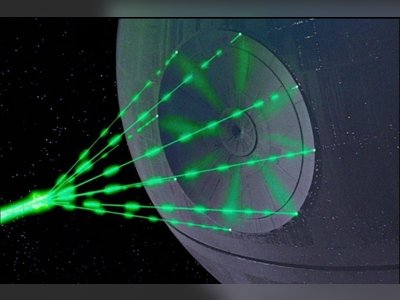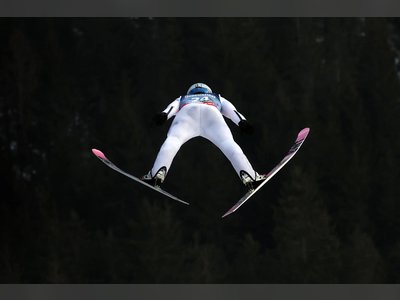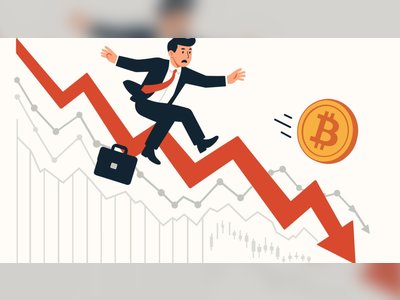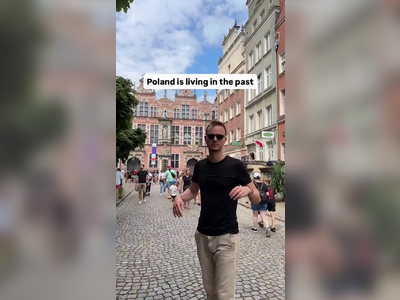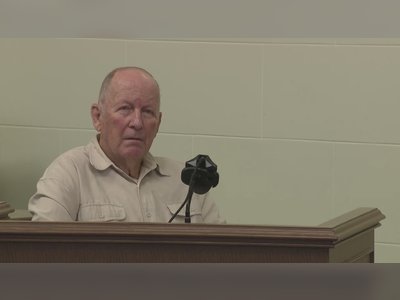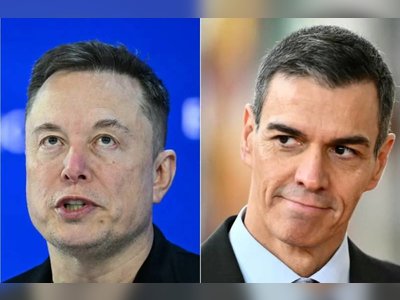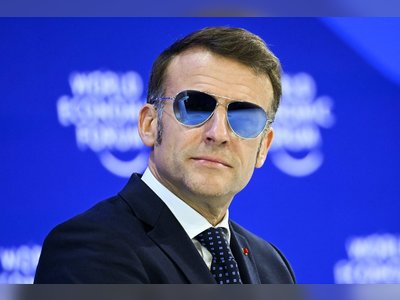Gergely Karácsony: It's Time to Start Taking Back Our Country
A festive assembly titled "Republic of Budapest" was held together with civil and student organizations by the municipality of Budapest.
Before Gergely Karácsony's speech, the widow of Alexei Navalny addressed the protest in a video message.
In her video message, Yulia Navalnaya, the widow of Alexei Navalny, spoke about her husband who fought for democracy and fair elections, wishing for Russia to live like a normal European country. "My husband was an extraordinarily strong and influential man. Millions stood behind him," she said, adding that Putin could not tolerate this. "UNFORTUNATELY, IT TURNS OUT THAT ONE OF PUTIN'S POLITICAL ACCOMPLICES IS VIKTOR ORBÁN, AND YOU ALL KNOW THIS BETTER THAN ANYONE ELSE," she stated.
"Putin is aware that he has loyal allies in Europe who help him undermine European unity, so he is not afraid of the consequences and feels untouchable because his friends cover for him," Navalnaya expressed in her message.
"There is a thought that I always emphasize in my speeches: Putin is not Russia, and Russia is not Putin." "And Hungary is not Orbán. Remember, we stand behind you in your fight for your country," Navalnaya communicated to the protesters.
KARÁCSONY: THE SUPPRESSED TRUTH HAS EMERGED WITH SUCH FORCE THAT IT SHAKES THE SYSTEM
Gergely Karácsony began his speech by acknowledging the respect the free world had for Navalny. "We respected the man who suffered under a system of lies and violence. The man who loved his country so much that he went home to die because he knew exactly what awaited him in Putin's Russia: prison and death," he said, adding that unlike government officials, he stood up for a minute of silence in memory of Navalny in the Hungarian Parliament.
Those who choose Putin over Navalny today, no matter what they preach on the steps of the National Museum, no matter how big a cockade they pin on themselves, no matter how many national flags they wave, and no matter how much money they spend on movies about the revolution, they are not fighting for Hungarian freedom, the Mayor of Budapest declared.
"WE DON'T HAVE TO BE AS COURAGEOUS AS NAVALNY WAS. HUNGARY IS NOT RUSSIA. NOT YET. BUT DAY BY DAY IT MOVES CLOSER," he continued.
It's time that we, too, gather our courage and start taking back our own country. Because as the saying goes, a cowardly people have no homeland.
"Honor to the brave, honor to Zoltán Ádám, who did not allow different rules to apply to government-affiliated billionaire's children than to everyone else at his university. Honor to every student who stands up for their teachers, for each other, and for the future. Honor to the two former educators of the Bicske orphanage who were willing to tell their city municipality over ten years ago about the horrors happening within the walls of the home. They were not listened to then, but ten years later the suppressed truth has emerged with such force that it shakes the system," Karácsony said.
The fact that Hungary today is no longer a republic is evident by having a president who pardoned an accomplice of a pedophile. This is not a fault of the system, this is the system itself, he articulated.
The Hungarian government is not taking care of those in hopeless situations, Karácsony stressed. He mentioned teachers, students, state wards, those living with disabilities, the poor, the homeless, and those who "love differently." According to him, instead, the government "distributes attention and mercy among themselves."
"With the pardon incident, however, the system has exposed itself; now it is creaking and groaning, and it will eventually end." He couldn't say exactly when, but he felt, knew, and saw that Hungarians were rising up. Increasingly, more are gathering the courage to take back their own homeland.
"Being the capital of the nation carries a special responsibility, as we must stand up for ourselves and for the country. We must safeguard the flame of freedom even when it seems to be extinguished elsewhere. To create a republic in a country where private interests rule. Because today the state is, at best, a joint-stock company instead of a republic," Karácsony argued.
KARÁCSONY: REPUBLIC OF BUDAPEST
"The municipalities, or at least some of them, today are the only part of the state that seeks to serve, not to rule. Over four years ago, the people of Budapest and many other Hungarian towns and villages decided to take back their municipalities from power. The power's men were replaced by the power of the people. Today in Budapest, it's not the opposition in power; it's the Budapest citizens because Budapest is a republic."
During an event co-hosted by civil and student organizations, the opposition politician emphasized that this does not mean that the capital wants to turn its back on the country, but rather that "it offers a refuge for the idea of the republic."
Regarding the June municipal elections, he stated many are dissatisfied with the government but also with the opposition. However, the municipal election is not about parties; it is about local communities, highlighted Gergely Karácsony.
The people of Budapest will have an easy choice at the polls he said, because for Budapest citizens, the government only has a declaration of war. Here are the values that the government denies and builds its politics on, he proclaimed.
He stated that as Mayor for the next five years, he wants to conduct an "life-affirming policy" centered on health care: healthy streets, healthy housing, and healthy air. On June 9th, everyone should go out and vote because then Budapest will remain the "guardian of the republic" he emphasized.
In her video message, Yulia Navalnaya, the widow of Alexei Navalny, spoke about her husband who fought for democracy and fair elections, wishing for Russia to live like a normal European country. "My husband was an extraordinarily strong and influential man. Millions stood behind him," she said, adding that Putin could not tolerate this. "UNFORTUNATELY, IT TURNS OUT THAT ONE OF PUTIN'S POLITICAL ACCOMPLICES IS VIKTOR ORBÁN, AND YOU ALL KNOW THIS BETTER THAN ANYONE ELSE," she stated.
"Putin is aware that he has loyal allies in Europe who help him undermine European unity, so he is not afraid of the consequences and feels untouchable because his friends cover for him," Navalnaya expressed in her message.
"There is a thought that I always emphasize in my speeches: Putin is not Russia, and Russia is not Putin." "And Hungary is not Orbán. Remember, we stand behind you in your fight for your country," Navalnaya communicated to the protesters.
KARÁCSONY: THE SUPPRESSED TRUTH HAS EMERGED WITH SUCH FORCE THAT IT SHAKES THE SYSTEM
Gergely Karácsony began his speech by acknowledging the respect the free world had for Navalny. "We respected the man who suffered under a system of lies and violence. The man who loved his country so much that he went home to die because he knew exactly what awaited him in Putin's Russia: prison and death," he said, adding that unlike government officials, he stood up for a minute of silence in memory of Navalny in the Hungarian Parliament.
Those who choose Putin over Navalny today, no matter what they preach on the steps of the National Museum, no matter how big a cockade they pin on themselves, no matter how many national flags they wave, and no matter how much money they spend on movies about the revolution, they are not fighting for Hungarian freedom, the Mayor of Budapest declared.
"WE DON'T HAVE TO BE AS COURAGEOUS AS NAVALNY WAS. HUNGARY IS NOT RUSSIA. NOT YET. BUT DAY BY DAY IT MOVES CLOSER," he continued.
It's time that we, too, gather our courage and start taking back our own country. Because as the saying goes, a cowardly people have no homeland.
"Honor to the brave, honor to Zoltán Ádám, who did not allow different rules to apply to government-affiliated billionaire's children than to everyone else at his university. Honor to every student who stands up for their teachers, for each other, and for the future. Honor to the two former educators of the Bicske orphanage who were willing to tell their city municipality over ten years ago about the horrors happening within the walls of the home. They were not listened to then, but ten years later the suppressed truth has emerged with such force that it shakes the system," Karácsony said.
The fact that Hungary today is no longer a republic is evident by having a president who pardoned an accomplice of a pedophile. This is not a fault of the system, this is the system itself, he articulated.
The Hungarian government is not taking care of those in hopeless situations, Karácsony stressed. He mentioned teachers, students, state wards, those living with disabilities, the poor, the homeless, and those who "love differently." According to him, instead, the government "distributes attention and mercy among themselves."
"With the pardon incident, however, the system has exposed itself; now it is creaking and groaning, and it will eventually end." He couldn't say exactly when, but he felt, knew, and saw that Hungarians were rising up. Increasingly, more are gathering the courage to take back their own homeland.
"Being the capital of the nation carries a special responsibility, as we must stand up for ourselves and for the country. We must safeguard the flame of freedom even when it seems to be extinguished elsewhere. To create a republic in a country where private interests rule. Because today the state is, at best, a joint-stock company instead of a republic," Karácsony argued.
KARÁCSONY: REPUBLIC OF BUDAPEST
"The municipalities, or at least some of them, today are the only part of the state that seeks to serve, not to rule. Over four years ago, the people of Budapest and many other Hungarian towns and villages decided to take back their municipalities from power. The power's men were replaced by the power of the people. Today in Budapest, it's not the opposition in power; it's the Budapest citizens because Budapest is a republic."
During an event co-hosted by civil and student organizations, the opposition politician emphasized that this does not mean that the capital wants to turn its back on the country, but rather that "it offers a refuge for the idea of the republic."
Regarding the June municipal elections, he stated many are dissatisfied with the government but also with the opposition. However, the municipal election is not about parties; it is about local communities, highlighted Gergely Karácsony.
The people of Budapest will have an easy choice at the polls he said, because for Budapest citizens, the government only has a declaration of war. Here are the values that the government denies and builds its politics on, he proclaimed.
He stated that as Mayor for the next five years, he wants to conduct an "life-affirming policy" centered on health care: healthy streets, healthy housing, and healthy air. On June 9th, everyone should go out and vote because then Budapest will remain the "guardian of the republic" he emphasized.
Translation:
Translated by AI
AI Disclaimer: An advanced artificial intelligence (AI) system generated the content of this page on its own. This innovative technology conducts extensive research from a variety of reliable sources, performs rigorous fact-checking and verification, cleans up and balances biased or manipulated content, and presents a minimal factual summary that is just enough yet essential for you to function as an informed and educated citizen. Please keep in mind, however, that this system is an evolving technology, and as a result, the article may contain accidental inaccuracies or errors. We urge you to help us improve our site by reporting any inaccuracies you find using the "Contact Us" link at the bottom of this page. Your helpful feedback helps us improve our system and deliver more precise content. When you find an article of interest here, please look for the full and extensive coverage of this topic in traditional news sources, as they are written by professional journalists that we try to support, not replace. We appreciate your understanding and assistance.









